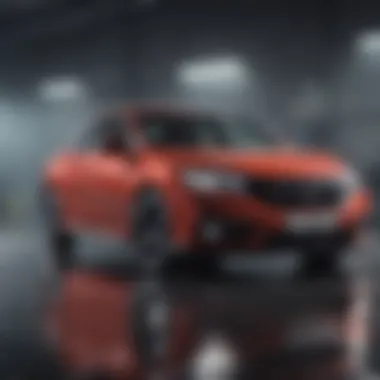Understanding Honda Recalls: Safety, Impact, and Trust


Intro
Recalls in the automotive industry serve as crucial touchpoints that reflect a manufacturer’s commitment to safety and quality. In this article, we will dissect the complicated landscape of Honda recalls, examining their implications not only for the vehicle owners and the company but also for the automotive industry at large.
Understanding Honda recalls is essential. They are not rare occurrences but rather events that can have measurable impacts on brand reputation, consumer trust, and market dynamics. The information provided herein will explore the fundamental reasons behind these recalls, diving deep into their processes and outcomes.
As we bring clarity to the subject, we will highlight historical cases to showcase how response strategies can shape public perception. Let’s uncover the multidimensional implications regarding responsibility and communication in the automotive sector. The insights gained from this exploration will be invaluable to both automotive enthusiasts and potential buyers, equipping them with knowledge about vehicle safety and consumer rights in a landscape marked by rapid technological advancements and increasing complexities.
Overview of Honda Recalls
The significance of Honda recalls extends beyond mere compliance with regulatory mandates. Applying recall processes shows how important safety is within the automotive industry. This section highlights the upcoming discussions about Honda’s recalls, contextualizing their necessity within wider automotive practices.
Definition and Scope
Honda recalls refer to the proactive measures initiated by the manufacturer when identified defects in their vehicles put consumers at risk. The scope of these recalls often pertains to aspects like safety concerns, quality assurance, and adherence to environmental standards. A recall could include repairs, replacements, or communication to the public about vehicle safety often mandated by federal regulations. It is relevant for owners and potential buyers who need to stay informed about any issues associated with their vehicles.
Historical Context
Understanding the historical context of Honda recalls allows us to recognize trends and patterns that may influence future recalls. Over the years, specific events, economic shifts, and regulatory changes have shaped how Honda approaches recall situations. For example, one major incident was the Takata airbag crisis that affected many automakers, including Honda. This situation highlighted not only Honda's response mechanism but also broader industry implications related to consumer trust and safety. By analyzing these past incidents, we can gain depth in understanding the context when a recall occurs, giving insight into its significance not just for Honda, but for the automotive industry as a whole.
Common Reasons for Recalls
The topic of common reasons for recalls is crucial in understanding how automobile safety operates, especially in large manufacturers such as Honda. Recalls are primarily initiated to address critical issues that can endanger consumers. By knowing the specific reasons for these recalls, vehicle owners can better comprehend the potential risks they face. In turn, manufacturers like Honda can demonstrate accountability to customers.
Safety Defects
Safety defects stand out as one of the most pressing reasons for vehicle recalls. A safety defect directly undermines the performance and security of the vehicle, threatening the safety of its occupants and others on the road. Defects like faulty brakes, power steering failures, or irregularities in airbag deployment can lead to fatal incidents, making it imperative for manufacturers to rectify these issues swiftly.
Consumers must pay attention to recalls related to safety defects because these alerts often come from findings during routine inspections, customer complaints, or even from involved accidents. Nase that prevailing these recalls shows how crucial prompt and effective communication is among manufacturers, governmental agencies, and the public. Failing to respond swiftly to potential safety concerns can significantly diminish consumer trust.
Environmental Compliance Failures
Another common reason for recalls relates to environmental policies. Manufacturers, including Honda, must adhere to strict regulations concerning emissions and environmental protection. Failures in environmental compliance often stem from parts not meeting required standards or unexpected software glitches in engine control systems. Such failures can lead to increased emissions, drawing penalties and forcing interventions to replace or repair affected components.
The impact of these recalls extends beyond the immediate realm of consumer safety. The environmental compliance recalls profoundly resonate with eco-conscious consumers. Not only does this aspect convey a manufacturer’s commitment to sustainability, it also affirms their patience towards new and evolving emission regulations.
Manufacturing Errors
Manufacturing errors offer insight into the operational complexities of automotive production. Even with the most advanced systems, flaws in the production process can result in issues like incorrect part assembly, use of substandard materials, or failure in quality control practices. These mistakes may seem trivial at times, however they can culminate into severe functional problems once the vehicle is on the road.
Brands such as Honda keenly comprehend that these errors represent a signals of reduced overall quality control in their production lines. Therefore, effective internal audits and corrections are imperative. Additionally, acknowledging and addressing these manufacturing errors allows manufacturers to enhance their processes and prevent future occurrences.
The Recall Process
The recall process is a crucial aspect of automotive safety and manufacturer accountability. It involves multiple steps beginning from identifying a potential defect to the point where the remedy is implemented. Understanding this process allows consumers to appreciate the mechanisms in place for their protection. It strengthens the trust between consumers and manufacturers by demonstrating commitment to safety. However, it also demands awareness from vehicle owners, so they can be proactive in addressing safety issues.
Initiation of Recall


The initiation of a recall occurs when a manufacturer or regulatory agency identifies a defect that poses safety risks. This can stem from various sources, including consumer complaints, internal safety reviews, or investigations conducted by agencies like the National Highway Traffic Safety Administration (NHTSA). Recognizing defects early helps avert potential incidents, leading to a more responsible automotive industry. Honda, for example, often monitors driver feedback and conducts regular evaluations of their vehicles. In some cases, recalls are voluntarily initiated by manufacturers, showcasing their commitment to vehicle safety, while in other cases regulatory pressure may compel action.
Notification and Communication
Once a recall is initiated, effective notification and communication strategies play a vital role in ensuring that affected vehicle owners are informed. Manufacturers are required to reach out to consumers through dedicated lines of communication, including letters, emails, and public announcements. Honda typically utilizes various platforms and social media to disseminate information widely. This communication often includes:
- Details of the defect.
- Instructions on what to do next.
- Information on how to obtain the remedy.
- Timeframe for resolving the issue.
Notifying affected parties in a clear and timely manner is essential to maintain consumer trust and promote safety awareness among Honda vehicle owners.
Remedy and Repair Procedures
The final stage in the recall process is the implementation of remedy and repair procedures. Once the defect is understood, Honda develops a fix that addresses it. This may involve parts replacement, software updates, or even redesigns. The aims is to restore the vehicle’s safety and performance. Owners of recalled vehicles are typically required to visit a dealership for the repairs, which are usually carried out free of charge.
Consumers should follow the provided instructions to ensure they benefit fully from the remedy. Furthermore, manufacturers may offer follow-up communications to confirm that the repair is completed satisfactorily. For example, a call or email may be sent to verify that the owner’s concerns are resolved.
The recall process not only ensures automotive safety but also plays a significant role in maintaining brand integrity.
Understanding these steps helps consumers navigate the complexities of recalls effectively, minimizing uncertainties around vehicle safety issues.
Impact on Vehicle Owners
Understanding how Honda recalls affect vehicle owners is essential. This topic includes consumer rights, responsibilities, and the practical steps that need to be taken once a recall is issued. Vehicle owners must navigate the sometimes complex landscape of recalls to ensure their safety and preserve the value of their automobiles.
It is crucial to be informed. Knowing about recalls can prevent risk. If drivers remain uninformed, they may continue using a vehicle that has known defects. In this regard, the implications go beyond mere notification; they encompass proactive measures that each consumer can take. Owners should routinely check for recalls related to their vehicles, either through Honda’s official channels or the National Highway Traffic Safety Administration.
Consumer Rights and Responsibilities
When a recall is issued, the rights of the consumer come to the forefront. Vehicle owners have the right to expect safe, reliable performance from their Honda vehicles. Under federal law, manufacturers are required to notify registered owners about safety recalls. This obligation underscores a commitment to consumer safety and accountability.
Additionally, vehicle owners should know that:
- They are entitled to have recall repairs performed without charge, regardless of warranty status.
- They are free to choose the repair shop, although using authorized Honda service centers is advisable for optimal care.
- In the case of repeated safety issues, consumers can request buybacks or replacements from the manufacturer.
Being aware of these rights not only protects the consumer but also empowers them in their relationship with Honda. However, responsibilities accompany these rights. As a vehicle owner, it becomes essential to respond promptly to recall notifications. Ignoring such alerts not only jeopardizes safety but also can lead to worsening conditions, potentially transforming malfunctions into more severe issues.
Effects on Vehicle Value
The impact of recalls on vehicle resale value cannot be dismissed. News of a recall can influence market perceptions of a vehicle substantially. Even if a vehicle has been repaired, some potential buyers may feel wary. Research indicates that vehicles subject to major recalls almost always experience depreciation in value.
This factor means that:
- Owners should address recall repairs quickly to mitigate long-term value loss.
- Maintaining a record of service for completed recalls may provide evidence of reliability to future buyers.
- Properly managing recalls can instill confidence when the time comes to resell or trade in.
In summary, staying informed about recalls can empower Honda owners. Knowledge of consumer rights enhances decision-making while timely responses to recalls can preserve safety and the vehicle's market value. Automakers like Honda appreciate proactive ownership, which builds trust and enhances the entire ownership experience.
Case Studies of Notable Honda Recalls
The examination of notable Honda recalls is critical for understanding the implications of vehicle safety and consumer confidence. These case studies offer insights into the reasons behind recalls, the manufacturer's response, and the broader impact on individuals and the automotive industry. By reviewing specific instances, consumers can grasp the varying nature of recalls and learn from the outcomes. Furthermore, manufacturers can assess their procedures and improve future response strategies. Here, we explore two significant examples: the Airbag Recall and the Fuel Pump Recall. Each case outlines distinct factors that contribute to the need for recalls.


Airbag Recall
The Honda airbag recall has become one of the most known instances in automotive history, primarily due to the involvement of Takata Corporation. This recall, which includes hundreds of thousands of vehicles, was initiated over defects linked to airbags that could deploy improperly, posing serious safety risks to occupants. The challenge with this recall lies in the sheer scale and complexity of identification, repair, and consumer communication.
Background of the Recall
In 2014, Honda alongside other manufacturers faced enormous scrutiny due to reported cases of airbag inflators exploding in an accident, releasing metal fragments into the vehicle. Not only Honda, but many other car brands served recalls based on their shared component sourcing. Sadly, loss of life was reported along with numerous injuries.
Effectiveness of the Response
Honda's approach involved reaching out to vehicle owners via direct mailing and public notifications, providing information on checking if their vehicles were affected. The problem shows just how vital strict quality control standards are in automotive manufacturing and the value of timely consumer communication. Car owners were encouraged to take action promptly by looking through the notice.
Lessons Learned
This case exemplifies the need for transparency and monitoring throughout the supply chain. Additionally, it led to increased awareness of the risks involved with defective automotive components, making consumers more vigilant. The potential aftermath of goodwill or serious brand damage largely hinges on positive consumer relations post-recall.
Fuel Pump Recall
Another significant recall by Honda occurred in 2020, involving various models due to potential issues with the fuel pump. Details highlighted how such components might fail. This recalls primarily stemmed from manufacturing defects and turned out to affect a wide range of Honda's well-known models.
Key Details of the Recall
Honda identified the issue when reports showed that some vehicles experienced stalling while driving, affecting overall safety. The action included notifying owners and providing free repairs at dealerships.
Communication and Effectiveness
Again, correspondence saw many notifications through both mail and web updates. The automotive industry’s prevailing principle is to keep transparency at the forefront of recalls to mitigate confusion and anxiety among owners. The amelioration process starts by determining the root cause, then through messaging to customers about vehicle safety.
Implications for Users and Industry
This case reiterated the importance of vehicle safety mechanisms in place and how manufacturers need a proactive stance. The implications are sizable; consumers expect the brands they trust to do everything possible to facilitate safety. Manufacturers are also obliged to self-audit and ensure quality before, during, and after production.
Learning from recalls not only helps manufacturers guard against future issues but also empowers consumers to make informed vehicle choices.
Through analyzing these case studies, it becomes clear that recalling vehicles serves a vital function within the automotive industry framework. Proper rectification not only ensures motorist safety but aids in restoring consumer trust, essential for both current and prospective buyers.
Legal Framework Governing Recalls
The legal framework governing recalls plays a crucial role in shaping manufacturer responsibility and consumer protection. Understanding this framework gives consumers insight into their rights while promoting accountability among automotive manufacturers. In the case of rescalls, global regulations establish rigorous standards. This promotes compliance and enhances the overall safety of vehicles on the road.
Regulations and Agencies Involved
Several regulatory bodies oversee automotive recalls and regulations. In the United States, the National Highway Traffic Safety Administration (NHTSA) is the primary agency. It holds authority for ensuring vehicle safety and enforcing compliance with federal standards. This includes mandatory reporting of defects and conducting investigations into potential safety hazards. Other countries have equivalent agencies. For example, in Canada, it’s the Canadian Motor Vehicle Safety Standards (CMVSS). These agencies enforce legal frameworks that dictate when a recall must be initiated.
The role of these agencies is pivotal. They assess information from various sources, including manufacturer reports and consumer complaints. When enough evidence is gathered, interventions may compel a company to recall. Regular audits and compliance checks ensure companies adhere not only to regulations but also ethical expectations regarding vehicle safety.
Legal Implications for Manufacturers


The legal implications for manufacturers during recall situations encompass a range of principles, predominantly focusing on liability, safety responsibilities, and potential repercussions for non-compliance. If a manufacturer fails to address safety-related defects efficiently, they face significant penalties. This may include fines or, in severe cases, the blood to their reputation.
Manufacturers are often required to follow stringent guidelines when addressing recalls. This includes appropriate notification to affected vehicle owners. A failure to meet these mandatories can lead to serious legal consequences. There lies an expectation that automakers will not only issue recalls but also remedy defects promptly without burdening consumers.
Furthermore, the potential for class-action lawsuits looms as a constant risk for manufacturers. If vehicle owners suffer losses due to a failure to act with due diligence, groups may arise to seek compensation. Such cases often gain public scrutiny, amplifying the consequence of negligent manufacturer behavior.
In summary, the legal landscape surrounding automotive recalls imposes a framework of accountability, pushing manufacturers to prioritize consumer safety while protecting consumers from potential harm.
Consumer Awareness and Action
Consumer awareness in the realm of automotive recalls is not just beneficial; it is essential. Increasing understanding of recalls equips consumers with needed knowledge to protect themselves and their investments. By staying informed about issues related to recalls, vehicle owners can make potentially life-saving decisions.
Awareness also facilitates communication with manufacturers. Consumers who are educated about their vehicle’s safety features and potential recalls can participate in the dialogue, addressing any deer-is issues directly with Honda or authorized dealers. The more informed a consumer is, the likely they are to take immediate action if problems arise.
The implications of procrastinating on recalls can be serious. Ignoring information about potential safety defects can lead to vehicle malfunctions, increasing the risk of accidents. Such scenarios underline the need for continuous learning and vigilance in this arena. Make it a habit to check your Honda model to ensure you understand ongoing recalls. This basic yet vital step is easy to perform yet immensely important.
Staying Informed about Recalls
To stay ahead in the fast-pacing automotive world, being up-to-date about recalls is paramount. Following several simpler ways helps ensure that one remains fully informed:
- Monitor Official Sources: Regularly visit the NHTSA website and Honda's official communications for new information.
- Sign Up for Alerts: Both Honda and safety agencies offer email alerts for recalls. Subscription can be worthwhile to simplify receiving notifications.
- Social Media Engagement: Following Honda’s official pages on platforms like Twitter or Facebook can be effective for quick updates on recalls.
- Join Online Communities: Engaging with forums such as Reddit on automotive topics can provide real-time updates shared by other car enthusiast.
These steps not only ensure awareness but also drive a proactive safety culture among vehicle owners. Responding proactively to safety warnings fosters a more responsible approach toward automotive ownership.
Steps to Take if Affected
If your Honda faces a recall, acting decisively can mitigate risks associated with vehicle malfunctions. Here are key actions to consider:
- Identify the Recall: Assess the details of the recall on the NHTSA website by entering your Vehicle Identification Number (VIN).
- Contact the Dealership: Reach out to your authorized Honda dealership. Inquire about the specific steps you need to take for the remedy.
- Schedule Inspection/Repair: Arrange for your vehicle to be inspected. Most recall repairs are performed at no cost to the owner.
- Document All Communications: Keeping detailed records of correspondence with the dealership and Honda is smart. These documents can be vital if disputes arise later.
- Follow Up: Should you have ongoing concerns, continue discussions with the manufacturer to ensure complete resolution.
Being proactive about recalls not only ensures your safety but also enhances the overall in-dealer efficiency in rectifying concerns, making good use of the services provided for a safer drive.
Through these steps, consumers take an active role in their safety and welfare, converting knowledge about recalls into tangible action against any risks posed. Proactively addressing recalls can influence not just individual vehicle safety but contribute to broader automotive industry accountability.
The Future of Recalls in the Automotive Industry
The landscape of automotive recalls is evolving, driven by several factors such as technology and consumer sentiments. With new innovations in vehicle design and smarter manufacturing processes, the future of recalls appears to hold pivotal changes for both manufacturers and consumers.
Technological Advancements
Technological advancements play a crucial role in transforming how automotive recalls are managed. The growth of connected vehicles is a significant development. These vehicles are equipped with sensors and systems that can communicate anomalies instantly to manufacturers, allowing for quicker detection of safety issues. As a result, recalls may become less cumbersome and more efficient.
- Data Analytics: By utilizing big data analysis, manufactures can predict potential defects early. Technologies like AI and machine learning can analyze patterns from various vehicles on road which might indicate a developing problem.
- Automated Notifications: Through advanced software, car manufacturers may communicate recall notices directly to consumers in real times. This can ensure that affected customers are informed swiftly, with proper steps to take for corrective measures.
- Remote Upgrades: The future could also see remote servicing capabilities for vehicles. Software-based recalls can be handled over the air, thus minimizing the need for consumers to visit dealerships physically.
The convergence of technology and automotive safety iteratively enhances recall processes and limits risks by addressing concerns before they become widespread.
Such advancements help build trust between manufacturers and consumers, knowing that there are proactive measures in place. Manufacturers with robust technological infrastructure can stand to benefit from enhanced reputation as they demonstrate responsiveness in safety interventions.
Shifts in Consumer Expectations
With evolving market dynamics, consumer expectations regarding recalls have also shifted. Today's consumer is more informed than ever and places incredible importance on safety and accountability.
- Transparency Demands: Consumers now expect manufacturers to be open about recalls. They seek clear information regarding the nature of a recall, what actions are being taken, and how it could affect them personally. This transparency may impact the reputation of a brand and its operations.
- Safety Integration: Purchases are more influenced by safety features and historical recall data. Buyers increasingly research a vehicle’s recall history before making a decision. As a result, companies are incentivized to prioritize safety measures in their development processes.
- Proactive Engagament: Instead of merely reacting to problems after a recall, consumers prefer brands who actively engage and educate them about potential issues. Being forward-thinking sets certain brands apart and builds deep loyalty among consumers.
Fulfilling these expectations is no trivial task for manufacturers. However, embracing these changes may lead to better customer relations, thereby securing long-term success.







